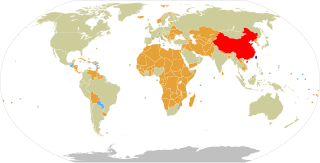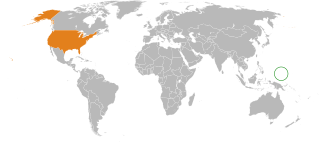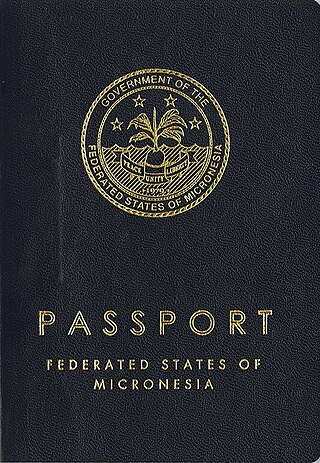
The government of the Federated States of Micronesia (FSM) conducts its own foreign relations. Since independence in 1986, the FSM has established diplomatic relations with 92 countries, including all of its Pacific neighbors.

The Republic of China (ROC), often known informally as Taiwan, currently has formal diplomatic relations with 12 of the 193 United Nations member states and with the Holy See, which governs Vatican City, as of 18 November 2023. In addition to these relations, the ROC also maintains unofficial relations with 59 UN member states, one self-declared state (Somaliland), three territories, and the European Union via its representative offices and consulates under the One China principle. The Government of the Republic of China has the 31st largest diplomatic network in the world with 110 offices.

Nauru, following independence from the United Kingdom, became a sovereign, independent republic on 31 January 1968. Nauru has established diplomatic relations with a number of nations, including most of its Pacific neighbors with which it maintains economic, cultural and administrative ties.
From 1916 to 1975, Tuvalu was part of the Gilbert and Ellice Islands colony of the United Kingdom. A referendum was held in 1974 to determine whether the Gilbert Islands and Ellice Islands should each have their own administration. As a consequence of the referendum, the separate British colonies of Kiribati and Tuvalu were formed. Tuvalu became fully independent as a sovereign state within the Commonwealth on 1 October 1978. On 5 September 2000, Tuvalu became the 189th member of the United Nations.

Visitors to the United States must obtain a visa from one of the U.S. diplomatic missions unless they come from one of the visa-exempt or Visa Waiver Program countries. The same rules apply for travel to all U.S. states, Washington, D.C., Puerto Rico and the U.S. Virgin Islands, as well as to Guam and the Northern Mariana Islands with additional waivers, while similar but separate rules apply to American Samoa.

Oceania is, to the People's Republic of China and the Republic of China, a stage for continuous diplomatic competition. The PRC dictates that no state can have diplomatic relations with both the PRC and the ROC. As of 2019, ten states in Oceania have diplomatic relations with the PRC, and four have diplomatic relations with the ROC. These numbers fluctuate as Pacific Island nations re-evaluate their foreign policies, and occasionally shift diplomatic recognition between Beijing and Taipei. The issue of which "Chinese" government to recognize has become a central theme in the elections of numerous Pacific Island nations, and has led to several votes of no-confidence.

Federated States of Micronesia–United States relations are bilateral relations between the Federated States of Micronesia and the United States of America.

After the United States established diplomatic relations with the People's Republic of China (PRC) in 1979 and recognized Beijing as the only legal government of China, Taiwan–United States relations became unofficial and informal following terms of the Taiwan Relations Act (TRA), which allows the United States to have relations with the Taiwanese people and their government, whose name is not specified. U.S.–Taiwan relations were further informally grounded in the "Six Assurances" in response to the third communiqué on the establishment of US–PRC relations. The Taiwan Travel Act, passed by the U.S. Congress on March 16, 2018, allows high-level U.S. officials to visit Taiwan and vice versa. Both sides have since signed a consular agreement formalizing their existent consular relations on September 13, 2019. The US government removed self-imposed restrictions on executive branch contacts with Taiwan on January 9, 2021.

The Republic of Kiribati and the People's Republic of China (PRC) established diplomatic relations on June 25, 1980, and resumed on September 27, 2019. Between 2003 and 2019, The government of Kiribati recognized the Republic of China, and, in accordance with the "One China" policy, the People's Republic of China did not have diplomatic relations to the country.

Diplomatic relations between China and the Federated States of Micronesia were established on September 11, 1989. The Chinese government first established an embassy in the capital of Palikir in 1990, and dispatched its first ambassador in 1991. In April 2023, the Chinese government allegedly threatened to assassinate the Micronesian president, David Panuelo, and so, Micronesia severed official relations between the two countries. It said it decided to increase relations with Taiwan and it accused China of bribing officials and trying to control the United States’ influence in the region. Initially, the Micronesian ambassador to Tokyo, Japan also served as Micronesia's ambassador to China, before Micronesia established an embassy in Beijing in 2007. President John Haglelgam was the first senior government agent from Micronesia to visit China, doing so in 1990. The current Chinese ambassador to Micronesia is Zhang Weidong, while the Micronesian ambassador to Beijing is Akillino H. Susaia.

Micronesian passports are the regular travel document issued by the Federated States of Micronesia to its citizens in order to enable them to travel outside the country.
This ancient and sovereign order currently only issues passports to three of its officers, all of whom also hold passports issued by other sovereign states. Technically, if they lost their other passports, the three holders of Sovereign Military Order of Malta passports could travel to at least 104 countries and territories without acquiring visas in advance.

India–Federated States of Micronesia relations are the international relations that exist between the Republic of India and the Federated States of Micronesia (FSM). The Embassy of India in Manila, Philippines is concurrently accredited to FSM.

David W. Panuelo is a Micronesian politician who served as the president of the Federated States of Micronesia from 2019 to 2023.

Nauru-Taiwan relations are relations between the Republic of Nauru and Taiwan.














